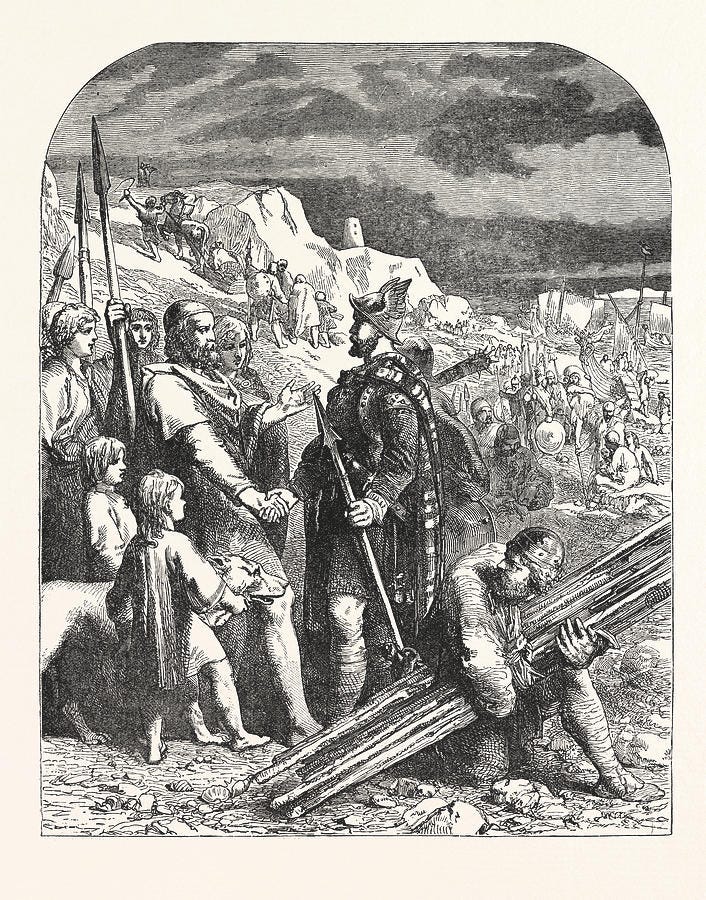“When there is too much naivete around, the universe has no choice but to crystallize out some betrayal.” - Robert Bly, Iron John
In the last blog post, we were discussing the ahistorically benign and peaceful view of Britain's history promoted by left-leaning commentators, using a comedy routine by Stewart Lee as an example. The reason I think that this routine was pertinent to our discussion is that it reveals a dangerously inflated sense of confidence in the capacity of our culture to survive in the face of overwhelming demographic change through mass migration. We left on an ominous note, regarding the rather disturbing reports that at least some of the 'migrants' being housed in hotels up and down Britain, on public money, are some sort of mercenary force stationed in this country, for undisclosed reasons.
Whether these reports are accurate or not is irrelevant; the same process has happened before, and will most probably happen again, many, many times.
Put it like this: imagine you're living in a country that is under military occupation by a declining empire. That military protection was quite adequate when the empire was in better health, but now it's overstretched. Urbanization has peaked, birthrates are going down, and the infrastructure is straining under the weight of hyper-complexity. Cultural stagnation and cosmopolitanism means the imperial centre can no longer supply the numbers that form the bulk of a functioning army; they will have to be brought in from the frontier.
If any of that sounds familiar, then it should. That was Britain in the 3rd century; it's also Britain in the 21st century. Details differ, however; Britain was always a backwater in the Roman period, but in the 3rd millennium we have the added complications that arise from our own fading history of imperial power. The contemporary world is more globalised than any previous era that we know of, and with a level of technological complexity that brings all kinds of potential curveballs that our forebears didn't have to worry about. Also, the Empire that is currently occupying our shores is actually a former British colony – if you don't believe me on that regard, count the number of American troops stationed in the UK, then the number of British troops in the USA, adjust for demographic proportions, and you'll quickly add up the score.
The Four Horsemen, however, are eternally pragmatic. Death still rides on his pale horse, even if War drives an M1 Abrams tank, or Plague brandishes a syringe. The mistakes of the past are worth learning from, if only to be better prepared for what tomorrow's harvest could bring. The stupidity of our supposed rulers can be relied upon, so the folly of Vortigern is worth noting for our purposes.
The name “Vortigern” means something like “High King”, and as such may have been either a given name or a title borne by a historical ruler in post-Roman Britain, as attested by multiple sources including Gildas, Bede, and the Anglo-Saxon Chronicle, as well as quasi-legendary accounts such as Nennius's Historia Brittonum. The Vortigern in question ruled a territory being continually harassed by Pictish and Irish raiders, opportunistically striking an area recently bereft of Roman protection. In response, he invited the Anglo-Saxons, led by Hengist, to work as a mercenary force in defence against the raiders, promising them land in return – this is in line with the late Roman practice of foederati. Predictably, the Saxons began to cause trouble of their own, taking control of more land than they were promised; in the legendary account given by Geoffrey of Monmouth, Vortigern called a meeting of British and Saxon leaders on Salisbury Plain to negotiate for peace, whereupon Hengist gave the order of “Nemet oure Saxas!” (“get your knives!”), and the Britons – unarmed due to cultural prohibition against attending such a negotiation bearing weaponry – were massacred. Geoffrey gives the massacre the name of the “Night of the Long Knives”, one and a half millennia before the conspiracy that led to the other atrocity of the same name.
Whether this particular Night of the Long Knives happened exactly as Geoffrey describes is debatable; for instance, he goes on to claim that Stonehenge was transported from Ireland by Merlin as a memorial to the slain Britons, which is probably the residue of a much more ancient myth that has been plastered on to Vortigern's story. Blacksmith and Arthurian historian Aurochs has unravelled some of the strands that have gone into the quasi-legendary figure of Vortigern, showing that some confusion between generations probably led to an unrealistically long reign being attributed to him. However, legendary material is worth studying for its own sake, as woven into its fabric are strands of archetypal significance and embodied ancestral wisdom that are not necessarily preserved elsewhere.
The story can be described, in essence, as one of folly, naivete, and betrayal. Vortigern's stupidity, vanity, and reckless pursuit of his passions – Geoffrey's version has him falling in love with Hengist's daughter Rowena, giving Hengist even more bargaining power over the foolish king – have disastrous consequences for his kingdom, leaving an almighty mess for his successors to clean up. On a societal level, the Romano-British nobles implicit trust in Hengist's men to abide by their own codes of honourable conduct is reflective of their naivete, and, as Robert Bly would put it, the universe had “no choice but to crystallize out some betrayal.”
Now, before applying these lessons to the modern day, I have to briefly pause to make a few points. Ethnicity, race, and migration are subjects which have become so emotionally loaded for many people that they find it almost impossible to discuss in a calm and frank manner. As such, any suggestion that mass immigration might have less than desirable consequences may be taken as a vindictive, bigoted slandering of all migrants. Sentimental outpourings about global citizens transcending borders, checking their privilege, or responding to humanitarian crises will then ensue, as well as the usual condemnation of 'racism, xenophobia, hatred', and other liberal bogeymen.
Doubtless, within any major wave of migration at any point in history, there will be kind-hearted, noble, and generous individuals. There will be those who have maintained courage and goodwill towards others despite tremendous adversity. There will be hardworking people who would be assets to any community into which they were welcomed. I have met more than a few myself.
This would have also been true of the Anglo-Saxon migration into Britain. Hengist, if Geoffrey is to be believed, was a bit of a treacherous character; whether this is fair to the real Hengist or not, it cannot have been true of all the Anglo-Saxons who made their home on this island. Nonetheless, as I said in my last piece, the impact of their settlement left a profound cultural trauma on those who retained a Brythonic identity. Indeed, it may have been thanks to the efforts of a few courageous warlords in the 5th and 6th centuries that any of their culture has survived to the present-day. Mass migration brings chaos, disruption, and uncertainty - and this particular phase has only just begun.
For one thing, within any number of people large enough to be considered a 'mass', you are going to encounter pretty much the full spectrum of human behaviour, from the saintly, to the mediocre, to the outright horrific. It is this latter quality that makes progressives so uneasy – ask one why they think Sweden has gone from one of the safest countries in the world to the “rape capital of Europe” in a few short decades, and you will witness a flurry of hand-waving, economic jargon, and weasel-wording, in an effort to drown out the jagged sound of cognitive dissonance.
In the case of Sweden – and similar situations playing out across Western Europe – we have a modern example of the kind of naivete against which the story of the 'Night of the Long Knives' is warning. An affluent, peaceful society, where the 'sexual revolution' and its supposedly emancipatory effect on women has been incorporated into intellectual orthodoxy for several decades, deliberately imports increasingly large numbers of people, including a disproportionate number of young men. These men often come from nations which have been recently devastated by warfare, and nations in which there are religious and cultural taboos against women engaging in public life unaccompanied, or without following a specific dress-code. Obviously, not all of these men will behave in an aggressive and predatory manner; however, even if only a small proportion has the potential to do so, those hundreds of thousands arriving every year will provide enough miscreants to destabilise the host country quite rapidly, as the example of Sweden demonstrates to an alarming degree.
The policymakers responsible are as vain and stupid as Vortigern, and the liberal-progressive bourgeoisie are as naïve as the Romano-British nobles who expected the Saxons to arrive unarmed. They believe that, eventually, the new arrivals will accept the intrinsic superiority of modern, secular, Western culture. Any problematic behaviour clearly stems from a mixture patriarchal conditioning and colonial trauma rooted in white supremacy, and will be eradicated through rigorous education on the value of consent, based on the principles of intersectional feminism; they will settle into a life of collecting Funko Pops and declaring pronouns in no time.
When there is too much naivete around, the universe has no choice but to crystallize out some betrayal.
What can we do about all of this? Do we flee to safer territories, or do we stay put and make the best of what we have?
These are decisions that we may have to make in due course, but regardless of what we choose, I'd like to propose that, if there is anything that you truly value in your culture, take steps to keep it alive. If, say, you want to preserve the Welsh language, learn it as best you can, and help others to do so. Same goes for classical music, medieval Neoplatonic philosophy, astronomy, or any other subject. If any wealthy philanthropists are reading, I'd like to suggest that old-school printing presses are likely to be a solid long-term investment, as modern-day printing methods do not produce durable books.
If you value something, keep it alive. The embers you protect may produce fires that burn for generations.






Carry the embers of our hearts into the future...
Excellent. We should do a podcast on this theme sometime.